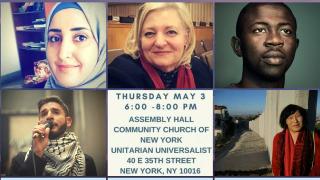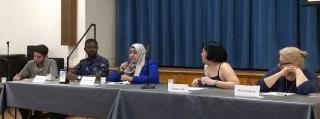Refugees, Migrants, and Resettlement in the Trump Era: What's Next?
By Rani Allan

Clockwise from bottom left: Rani Allan, Somia Elrowmeim, Henia Dakkak, Edafe Okporo, Pauline Park
Panel Event Video
This panel was recorded and the full video is available to watch here.
On the warm May evening of May 3rd, concerned individuals gathered at the Community Church of New York to engage in the critically-needed discussion on the refugee and migration crisis. Moderated by the Unitarian Universalist U.N. Office’s Refugee Program Intern Rani Allan, the panel discussion featured four distinguished speakers coming from diverse backgrounds, however a common purpose gathered them together — the need to put in place an accommodating resettlement process for refugees, asylum-seekers, and migrants.
In the year 2016, as many as 65.6 million people were forcibly displaced worldwide. But only 189,000 were resettled. In the same year, former U.S. President Obama admitted 97,000 as refugees. But in 2017 with new President Trump, the number dropped drastically to 28,000. Thus the percentage of resettled refugees in the U.S. based on the world’s refugee population dropped to only 0.2%, compared to the country’s low historic average of 0.6%. The past year has also witnessed dangerous policies to the refugee and migrant communities of the U.S. and world. Trump rescinded the Deferred Action for Childhood Arrivals policy, as well as issued his long-promised Muslim Ban, specifically targeting countries with the highest refugee populations like Syria, Somalia, and Iran. Civilians trying to flee war are facing additional challenges to seek asylum and are pushed to vulnerability. But it’s not easy for those who have already resettled either. Hate crimes against Muslims and Arabs have risen significantly. The United States consistently detains asylum-seekers on the border and within its land, and places them in detention facilities managed by the private prison sector. The asylum-seekers and migrants are often expelled by the U.S. Department of Homeland Security Immigration and Customs Enforcement. And just last month, the New York Times reported that federal agencies lost track of nearly 1,500 migrant children.

Panelists left to right: Rani Allan (moderator), Edafe Okporo, Somia Elrowmeim, Pauline Park, Henia Dakkak.
Edafe Okporo, board member of First Friends of New Jersey and New York, spoke about the housing struggles asylum-seekers face. ”There are better systems in which the government [of the U.S.] can do to house asylum-seekers,” he said. Calling for better policies to be put in place, the LGBT+ refugee from Nigeria gave an example of the temporary housing service available in Canada, as well as the policy in the United Kingdom to not detain an asylum-seeker for more than 72 hours.
Somia Elrowmeim, Women’s Advocacy leader at the Arab American Association of New York and Union of Arab Women, spoke about the needed priorities for refugees and migrants. “When they first come to the U.S., they search for a safe place,” she mentioned. “But when they arrive here, they find that the situation is something else.” Members of the Arab community that Ms. Elrowmeim works with, and whom I previously worked with under her supervision, face difficult challenges in finding jobs, often due to language-barriers. It takes at least one year to find a self-sustaining job for the newcomers, but even then, the situation doesn’t become much easier, as racism has been persistent. Particularly visibly-identifying Muslims such as hijabi women have become prone to a rise in racist attacks.
Pauline Park, chair of the New York Association for Gender Rights Advocacy which she co-founded, spoke about the hardships LGBT+ asylum-seekers face. The hardships get worse for LGBT+ refugees of color. Park gave an example of a transgender friend of a friend she knew from Guyana who, seeking asylum in the U.S., was placed in a detention facility in New Jersey. Because her legal sex designation on her ID was male, she was thrown in a male-designated facility. It did not end there. To separate her from men in the facility, she was forced into solitary confinement — marking it a punishment for her gender identity. It wasn’t until receiving assistance from Immigration Equality that her burden was eased.

Rohingya refugees fleeing persecution by boat. A number of the refugees have drowned while trying to resettle somewhere safe, even as the Trump administration lowered the number of asylum-seeker acceptances last year.
Henia Dakkak, technical advisor for the United Nations Population Fund (UNFPA), spoke about the vulnerability of women and girls who are refugees and internally displaced persons. Particularly, women with disabilities including mental health needs are the most vulnerable. A lot of women find themselves in new situations. A typical woman from Yemen or Syria, usually had a support system in her home community. But once moved out of her comfort zone, she meets many new challenges. Teenage girls are at risk to forced marriage and undergo female genital mutilation. There are multiple cases were some ended up facing rape, harassment, physical and mental abuse, stigmatization, as well as language barriers which are present and pressing issues. Overall, there are multiple vulnerabilities and intersections that have to be looked at and addressed.
As the refugee and migrant crisis worldwide intensifies, a call for action stands more necessary than ever. The same as how the panel featured speakers from multiple, diverse backgrounds, the experiences of all refugees and migrants worldwide vary, but we all share the same need for basic human rights of dignity and the right to a decent life, as well as the urgency for us to act in support.